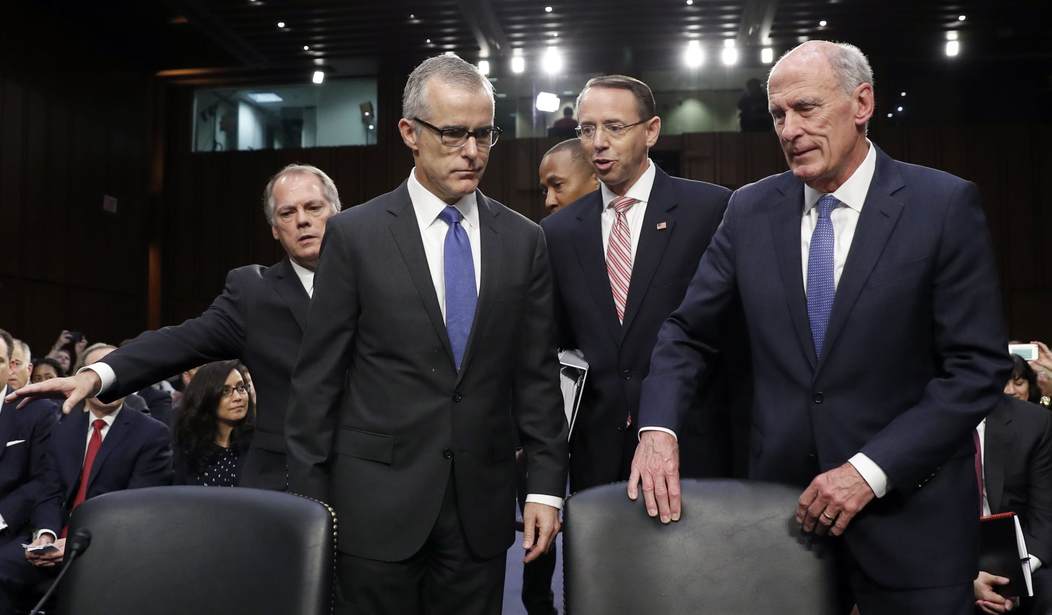Former Deputy FBI Director Andrew McCabe said Tuesday night that he thinks “it’s possible” President Trump could be a Russian asset, adding he’s “really anxious” to see the results of special counsel Robert Mueller’s investigation.
McCabe, on a media tour promoting his new book The Threat: How the FBI Protects America in the Age of Terror and Trump, told CNN that “things we had perceived through these series of odd interactions with the president, that Director Comey had had and other things that we had come across during the course of our investigation of Russian meddling in the campaign and the potential Russian involvement with people associated with the Trump campaign” were “the very concerns that led us to the point to believe we think it’s time for us to open an investigation.”
“If the president is in fact that dangerous — I mean, as a lifelong public servant, as someone who took an oath to protect the Constitution, didn’t you have a duty to come forward before now, before writing a book?” host Anderson Cooper asked.
“We thought that a potential threat to national security might exist — that being that the president of the United States may have attempted to obstruct justice in his efforts to thwart and impede our investigation of Russian influence, and if he had done so, why? Why would any American president try to stop the FBI from investigating what the Russians might have done to our election?” McCabe replied.
“Certainly, you’re limited in the way that you can speak out while you are an FBI official. I left under adverse circumstances,” he added. “And in my estimation, the best way to speak out, the best way to present the way my thoughts about how I think this president is undermining the role of law enforcement, undermining the role of our intelligence infrastructure, and negatively impacting the men and women of the FBI and across the intelligence agencies’ ability to protect this country on a daily basis, that’s something that — an argument that I felt like I had to make in a thoughtful way in that book.”
McCabe was fired by then-Attorney General Jeff Sessions on March 16, just over a day before McCabe’s planned retirement. The Justice Department’s inspector general found that McCabe lied to investigators on multiple occasions and disclosed information to the media as a power play; he disputes the report.
McCabe’s book manuscript underwent months of review at the FBI before it could be published, but he said he was “very happy with the product that came out of that process and glad to have the FBI seal of approval on it.”
“The simple fact that the deputy attorney general and the acting director of the FBI were trying to figure out how to navigate a situation in which we thought the president of the United States might be involved in obstruction of justice, and might be doing that to cover up some sort of inappropriate relationship with the Russians — I mean, it was a head-spinning moment,” he said of his recollections of discussions of the 25th Amendment, which outlines how to replace the president in the event of death, removal, resignation, or incapacitation.
“I think we have lost sight of the fact that Rod Rosenstein decided to appoint special counsel Mueller. And by doing so, I think — you know, I think the entire country owes him a debt of gratitude,” McCabe said of the deputy attorney general. “Rod did the right thing by putting the right person in charge of that investigation.”
Asked whether the president’s family was being investigated before or after the appointment of Mueller, McCabe replied, “That’s something I don’t feel comfortable talking about as it goes to kind of — could go to an ongoing investigative matter.”
McCabe said he “didn’t know anything” about former Deputy Assistant Director of the Counterintelligence Division Peter Strzok and FBI attorney Lisa Page’s text messages, which he called “inappropriate and incredibly unfortunate.”
“I think the important thing to remember is that Pete Strzok and Lisa Page are two people that served this country well. They made some unfortunate and I think poor decisions in their personal lives, particularly with respect to these communications between the two of them, decisions that cast incredible doubt and speculation on the bureau, something that I’m sure neither of them ever intended to do,” he said. “The fact is that good people make poor decisions every day. It doesn’t completely erase the good service they gave to this country. Not one time in my working with them did I ever see anything that I perceived to be political bias or political influence in the decisions they were making and the work we were doing.”









Join the conversation as a VIP Member